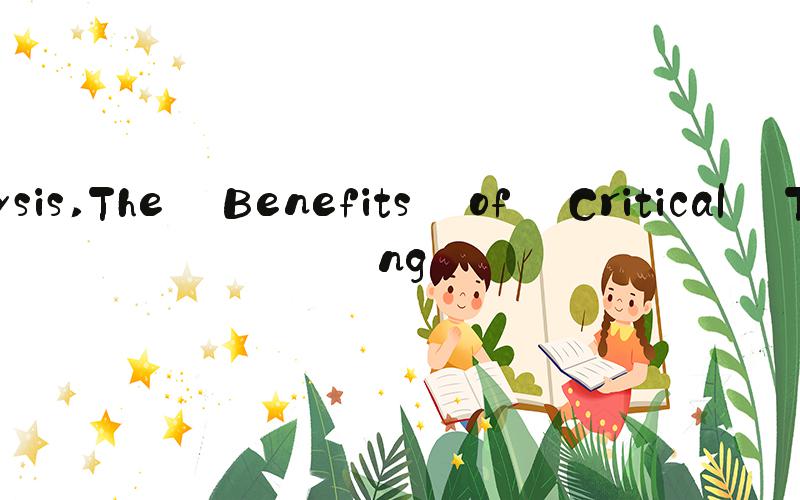AI答案
 Analysis: Understanding the Importance of Critical Thinking
Analysis: Understanding the Importance of Critical ThinkingWhen it comes to making decisions and solving problems, critical thinking is an essential skill. It is the ability to objectively analyze information, consider multiple perspectives, and make well-reasoned judgments. Although critical thinking is highly valued in virtually every area of life, it is not a skill that comes naturally to everyone. Fortunately, with practice, anyone can become a better critical thinker. In this article, we will explore the importance of critical thinking and provide some tips for developing this vital skill.
The Benefits of Critical ThinkingThere are many benefits to becoming a critical thinker. Perhaps the most significant advantage is the ability to make more informed decisions. Critical thinkers are less likely to be swayed by emotions or biases. They are also more likely to consider a variety of factors when making decisions, such as context and potential consequences.
Critical thinking can also enhance our problem-solving abilities. By breaking down complex problems into smaller, more manageable pieces, critical thinkers can identify potential solutions that might not be immediately apparent. Additionally, by considering multiple perspectives, critical thinkers can devise more creative solutions than those who rely on a narrow, one-sided approach.
Another critical benefit of critical thinking is the ability to better understand and evaluate the information we encounter. In today's information-rich world, we are continually bombarded with a vast array of content, from news to advertising. However, not all of this information is accurate, trustworthy, or objective. Critical thinking allows us to sort through the noise and determine the truth, helping us make more informed decisions about our lives and the world around us.
Developing Critical Thinking SkillsNow that we understand the benefits of critical thinking, let's explore some tips for developing this essential skill:
1. Question EverythingCritical thinking starts with questioning assumptions and conventional wisdom. Don't just accept things at face value – be curious and ask questions. When you encounter a claim or assertion, ask yourself: "How do we know this is true? What evidence supports this claim?" By questioning everything, you can gain a deeper understanding of the world and challenge your own biases and assumptions.
2. Consider Multiple PerspectivesCritical thinkers understand that there is rarely one "right" answer to a problem or question. By considering multiple perspectives, critical thinkers can gain a more comprehensive understanding of the issue and identify potential solutions that might not be obvious from a single point of view. When faced with a problem, take the time to consider how different people with varying experiences and backgrounds might approach the issue.
3. Evaluate Evidence CarefullyNot all evidence is created equal, and critical thinkers understand that. When evaluating evidence, consider the source, the quality, and the potential biases. Avoid falling victim to confirmation bias – the tendency to seek out evidence that supports our preexisting beliefs – by seeking out disconfirming evidence and considering it carefully.
4. Practice, Practice, PracticeDeveloping critical thinking skills is not something that happens overnight. It requires practice and dedication. Consider seeking out opportunities to practice critical thinking, such as by participating in debates, analyzing news stories, or solving puzzles. The more you practice critical thinking, the better you will become.
ConclusionCritical thinking is a valuable skill that can enhance virtually every aspect of our lives. By becoming a better critical thinker, we can make more informed decisions, solve problems more effectively, and navigate the information-rich world we live in. Although the development of critical thinking skills requires dedication and practice, the benefits are well worth the effort.
